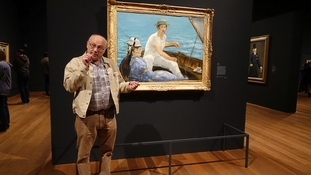Well, there has been some misunderstanding about the philosophical connotations of having ones work done by others under guidance, versus the legal connotations. Even Ansel Adams farmed out his big mural printing work to a big commercial lab in SF better equipped for that than his own little darkroom was. And numerous artists like Damien Hirst (like him or not) have resorted to specialized craftsmen when upscaling the size of projects. That kind of lack of personal "hands-on" thing can be debated, but there's nothing inherently illegal about it.
What is illegal is deliberate misrepresentation. For example, there was a gallery in Carmel dedicated to the oil painting seascapes of a famous French painter of such and such a name (which I don't remember). People were being encouraged to buy his seascapes because these had great value in that particular genre. But that person didn't even exist! It was all being done by an assembly line in Mexico without any kind of significant artist oversight - basically a complete misrepresentation and scam. So the FBI eventually jumped on that pretty hard. Those paintings weren't cheap (even though they didn't look very impressive to me), and buyers were infuriated once they discovered they had been suckered.
Likewise, there was nothing inherently wrong in how Kincade invented a means to mass-produce basically posters at an exceptionally high level of quality. That included his fancy paint by numbers templates which allowed other workmen to fill in the colors in order to match clients own decor schemes. But when he tried to skirt the law by just adding a spot of two of his own paint, with his own hand, onto those, and then claiming that made each of them "original" paintings of high collector value (as deliberately implied by his sales agents), that was tempting the law to take a closer look at what was really involved, because many people were being deceived into paying unrealistically high prices for what they thought was a limited collector commodity, but which turned out to be mass-produced.
And that sudden awakening turned into a domino effect, and undercut his momentum right when he was financially overextended trying to expand his business empire into Kincade-theme real estate development too. So as the whole ball of yarn was collapsing, he resorted to conning and stiffing his own franchisees, cheating them, and that's when the FBI finally swung down the hammer.
I suspect it's just a matter of time, when it comes to Peter Lik too. Sooner or later, people like that get emboldened enough to think they can get away with anything. In the Vegas area, the FBI has much bigger fish to fry than him. But if a lot of consumer complaints start coming in from disillusioned buyers, something might happen. But in his case, lots of those rich types simply don't care. If tired of their $40,000 sofa, they just throw it out and buy another one. Same with a big piece of framed decor on the wall. They aren't really art collectors at all, but mostly conspicuous consumption types with giant indoor walls needing to be covered with something.







